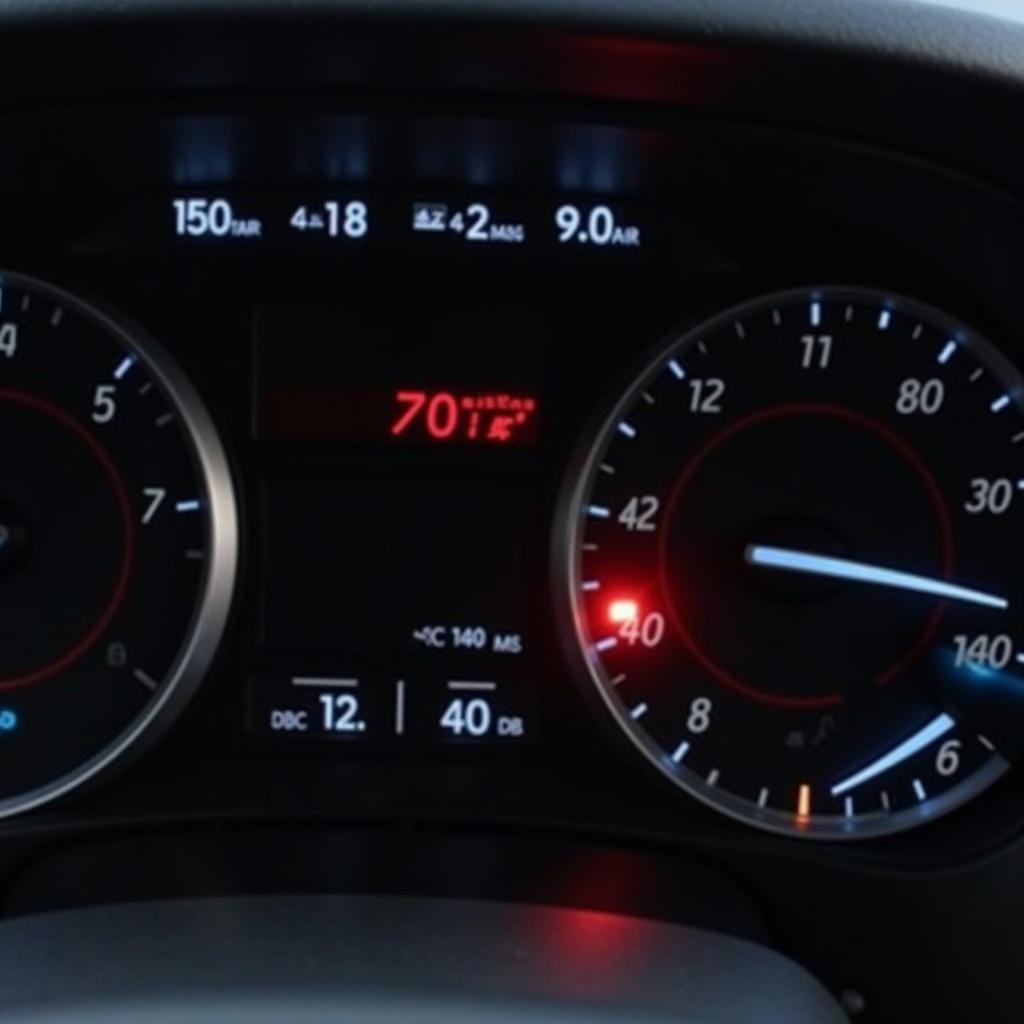If you own a 2016 Ford Focus, you may have encountered the dreaded brake light warning on your dashboard. This warning light, often accompanied by a chime or message, indicates a problem with your vehicle’s braking system, which should never be ignored. This article delves into the common causes behind the 2016 Ford Focus brake light warning and provides potential solutions to get you back on the road safely.
Understanding Your Ford Focus Brake Light Warning
Your 2016 Ford Focus uses sensors to monitor various components of your braking system. When one or more of these sensors detect an issue, the brake light warning on your dashboard illuminates. While this warning light can be alarming, it’s crucial to remember that it doesn’t always signify a catastrophic problem. However, it does require immediate attention to diagnose and address the underlying cause.
Common Causes of a Brake Light Warning
Several issues could trigger the brake light warning on your 2016 Ford Focus. Here are some of the most prevalent culprits:
1. Worn Brake Pads
This is the most common cause of a brake light warning. Brake pads naturally wear down over time due to friction. When they reach a certain thinness, a sensor embedded within the pad triggers the warning light, signaling it’s time for a replacement.
2. Brake Fluid Leak
Brake fluid is the lifeblood of your car’s braking system, transmitting the force from your foot on the brake pedal to the wheels. A leak in the brake lines, calipers, or wheel cylinders can cause a drop in brake fluid pressure, activating the warning light.
3. Faulty Brake Light Switch
The brake light switch, located under the dashboard near the brake pedal, is responsible for activating your brake lights when you press the pedal. A malfunctioning switch can disrupt this signal, causing both the brake lights and the warning light on the dashboard to malfunction.
4. ABS Sensor Issues
Your Ford Focus is equipped with an Anti-lock Braking System (ABS), which prevents wheel lockup during hard braking. ABS sensors at each wheel monitor wheel speed and relay this information to the ABS control module. A faulty ABS sensor can disrupt this process, triggering the brake light warning.
5. Malfunctioning ABS Module
While less common, a failing ABS module can also be the culprit behind a brake light warning. The ABS module is the “brain” of the ABS system, and any issues with it can disrupt the entire system.
Diagnosing the Problem
Determining the exact cause of the brake light warning often requires a bit of investigation. Here are some steps to help you diagnose the issue:
-
Check Your Brake Fluid Level: Locate the brake fluid reservoir under the hood and inspect the fluid level. If it’s low, there’s likely a leak somewhere in the system.
-
Inspect Your Brake Pads: If you’re comfortable doing so, you can visually check the thickness of your brake pads through the spaces between the wheel spokes. Worn pads will appear significantly thinner than new pads.
-
Listen for Unusual Noises: Grinding or squealing noises when applying the brakes often indicate worn brake pads.
-
Feel for Braking Issues: Does your brake pedal feel spongy or unresponsive? This could point to air in the brake lines or a problem with the master cylinder.
 Ford Focus Dashboard Brake Warning Light
Ford Focus Dashboard Brake Warning Light
Solutions and Repairs
Once you’ve identified the potential cause of the brake light warning, it’s crucial to address it promptly. Here are some common solutions:
-
Brake Pad Replacement: If your brake pads are worn, they’ll need to be replaced. It’s generally recommended to have a professional mechanic perform this task.
-
Repairing Brake Fluid Leaks: Leaks in the brake system require immediate attention. This involves identifying and repairing the source of the leak, whether it’s a damaged brake line, caliper, or wheel cylinder.
-
Brake Light Switch Replacement: A faulty brake light switch is a relatively simple and inexpensive fix. A mechanic can quickly diagnose and replace a malfunctioning switch.
-
ABS Sensor or Module Repair/Replacement: Diagnosing and repairing ABS sensor or module issues typically requires specialized tools and expertise. It’s best to consult with a qualified mechanic or dealership for these repairs.
When to Seek Professional Help
While some brake light warning causes can be addressed with basic DIY maintenance, others require the expertise of a professional mechanic. If you’re unsure about the cause of the warning or uncomfortable tackling repairs yourself, it’s always safest to consult with a qualified professional.
“Ignoring a brake light warning is like playing Russian roulette with your safety,” says veteran mechanic John Smith. “Even if you think it’s a minor issue, it’s always best to have a professional diagnose the problem to ensure your brakes are in optimal working order.”
Preventing Future Brake Light Warnings
Regular maintenance is key to preventing brake light warnings and ensuring the longevity of your Ford Focus’s braking system. Here are some preventative measures:
-
Regular Brake Inspections: Have your brakes inspected by a qualified mechanic at least once a year or every 12,000 miles.
-
Timely Brake Pad Replacements: Don’t wait for the brake light warning to illuminate before replacing your brake pads.
-
Brake Fluid Flush: Flush and replace your brake fluid every 2-3 years or as recommended by your owner’s manual.
-
Be Mindful of Driving Habits: Aggressive driving habits, such as hard braking and accelerating, can accelerate brake pad wear.
Conclusion
Addressing the brake light warning on your 2016 Ford Focus is crucial for your safety and the well-being of your vehicle. By understanding the common causes, taking steps to diagnose the issue, and addressing it promptly, you can ensure your brakes are always in optimal working order. Remember, a little preventative maintenance goes a long way in avoiding costly repairs and keeping you safe on the road.

